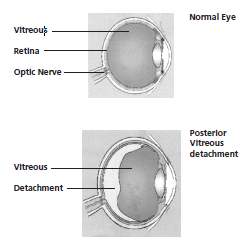This information leaflet is for patients who suffer from “floaters” or occasional flashes of light in the eye known as “posterior vitreous detachment” It explains the condition, how it is treated and what to expect.
This is a condition where the clear, jelly-like substance (vitreous) that fills the inside of the eye, separates from the retina (the lining at the back of the eye).
See diagram below

The cause
The vitreous jelly shrinks with age and separates from the retina.
Signs and symptoms
To look at, the eye will appear normal, but you may notice:
- Black floaters in your vision, which move with the eye and then settle as the eye rests.
- Flashing lights that flicker round the edge of your vision.
Floaters are more common in people with short sight and may make reading difficult if the floaters get in the way of the line of sight.
How the doctor confirms it
The pupils will need to be dilated to allow the back of the eye to be thoroughly examined.
The drops result in a blurring of vision for up to six hours, this will affect your ability to drive a car.
These tests are simple and painless.
The treatment
There is no treatment needed; most people get used to the floaters after several months, so that they are no longer bothersome.
The flashing lights should gradually settle too, in a shorter time – a few days or weeks.
The risks of this condition
Posterior vitreous detachment is not serious in itself, but a small percentage can lead to retinal tears; this in turn can result in a more serious condition known as a retinal detachment, where the retina itself starts to come away from the back of the eye.
This would need immediate treatment.
Retinal tears will require treatment with a laser in order to avoid progression to a retinal detachment.
If you notice the following signs of retinal detachment:
- a sudden increase in the number of floaters in your vision, so that you can see thousands of tiny ones; and/ or
- new floaters;
- a part of your visual field is missing / a curtain is moving across your vision
Then you should have the eye examined within 24 hours to check that you do not have a retinal detachment.
Contact details:
The Luton & Dunstable Hospital Eye Casualty Clinic, Monday – Friday, 9am-5pm on 01582 491166.
Evenings and weekends phone 01582 491166, and ask the operator for the eye doctor.
For the eye specialist nurses phone 01582 491166, and ask the operator to bleep 110 or 273, Monday – Friday 9am – 5pm.
